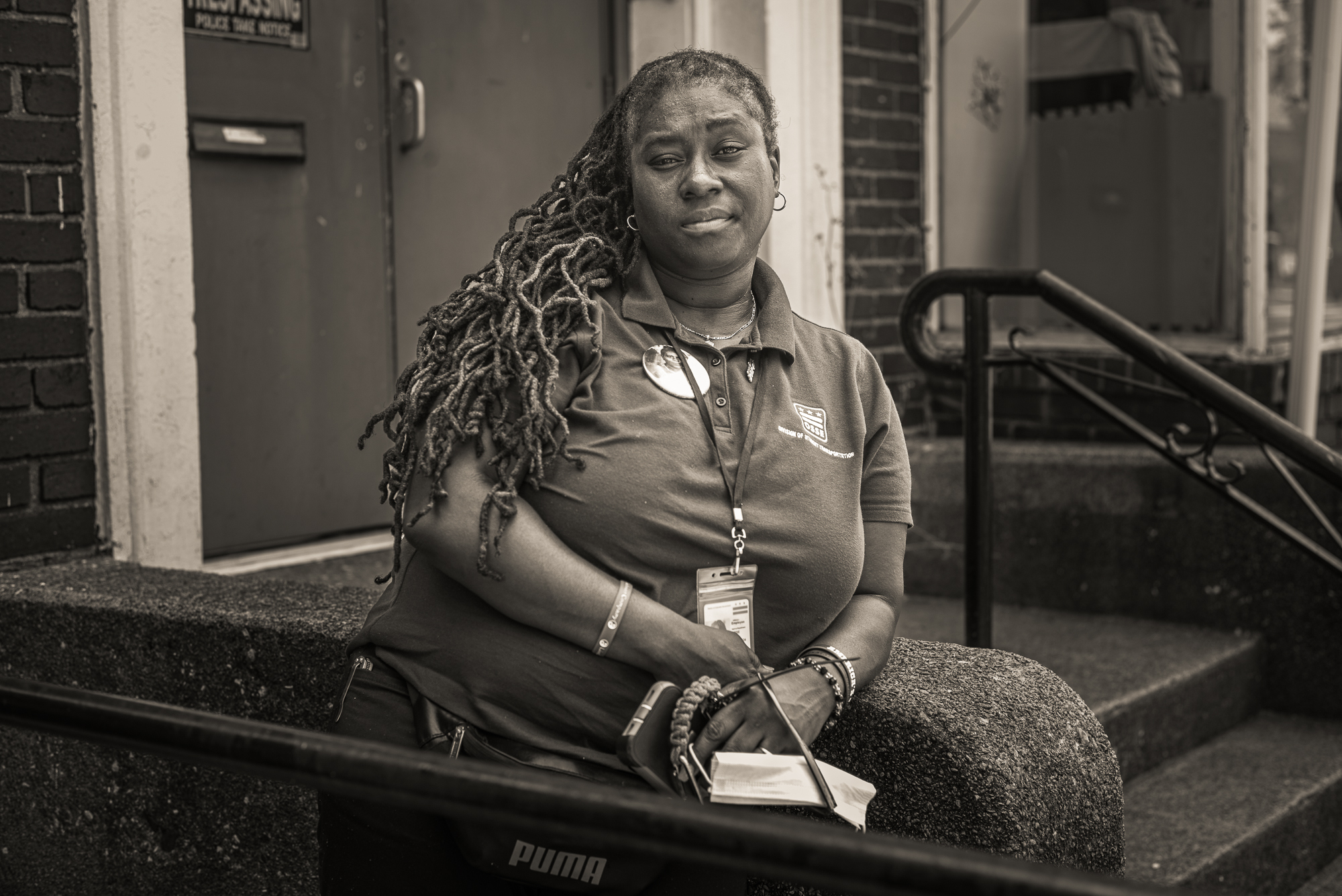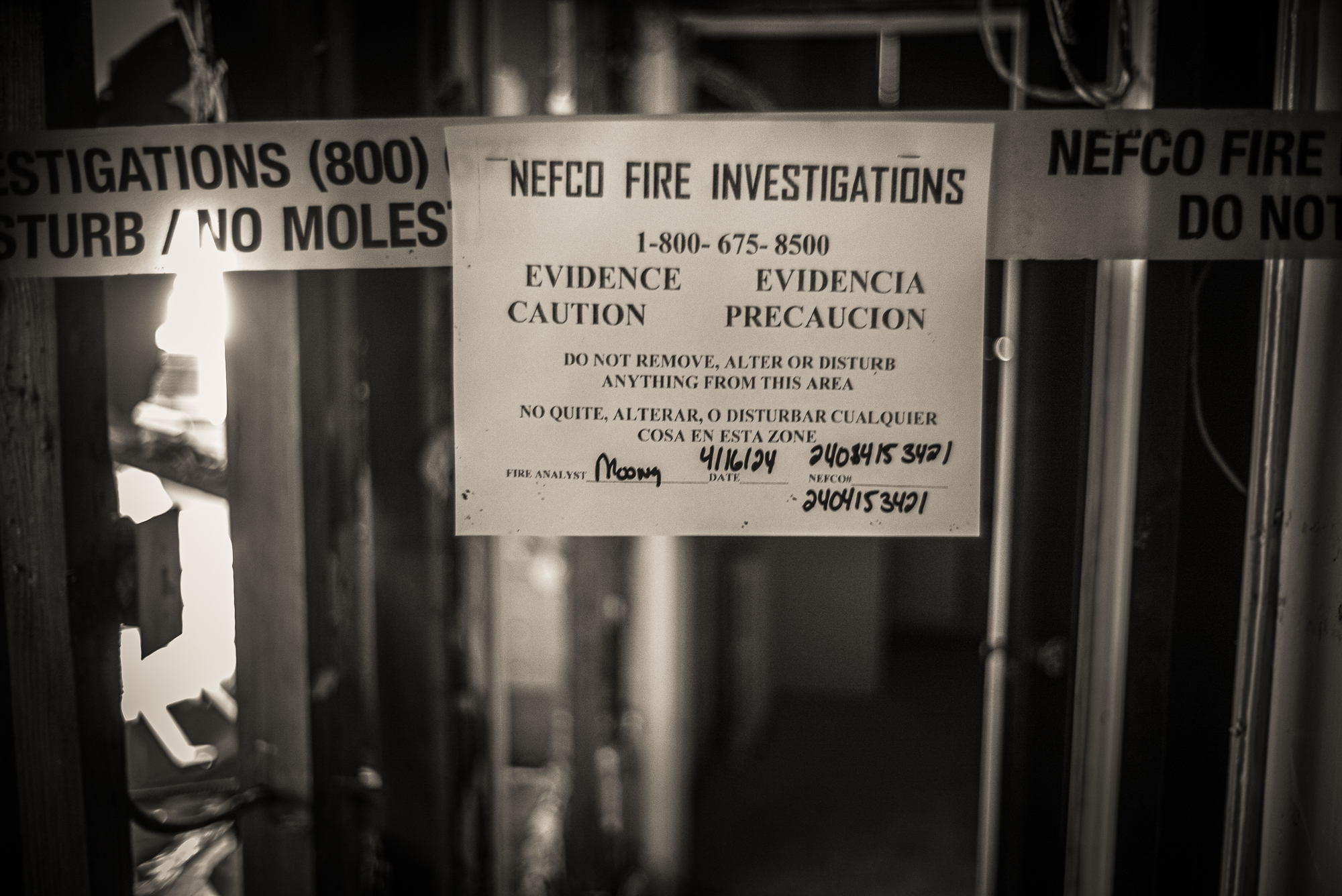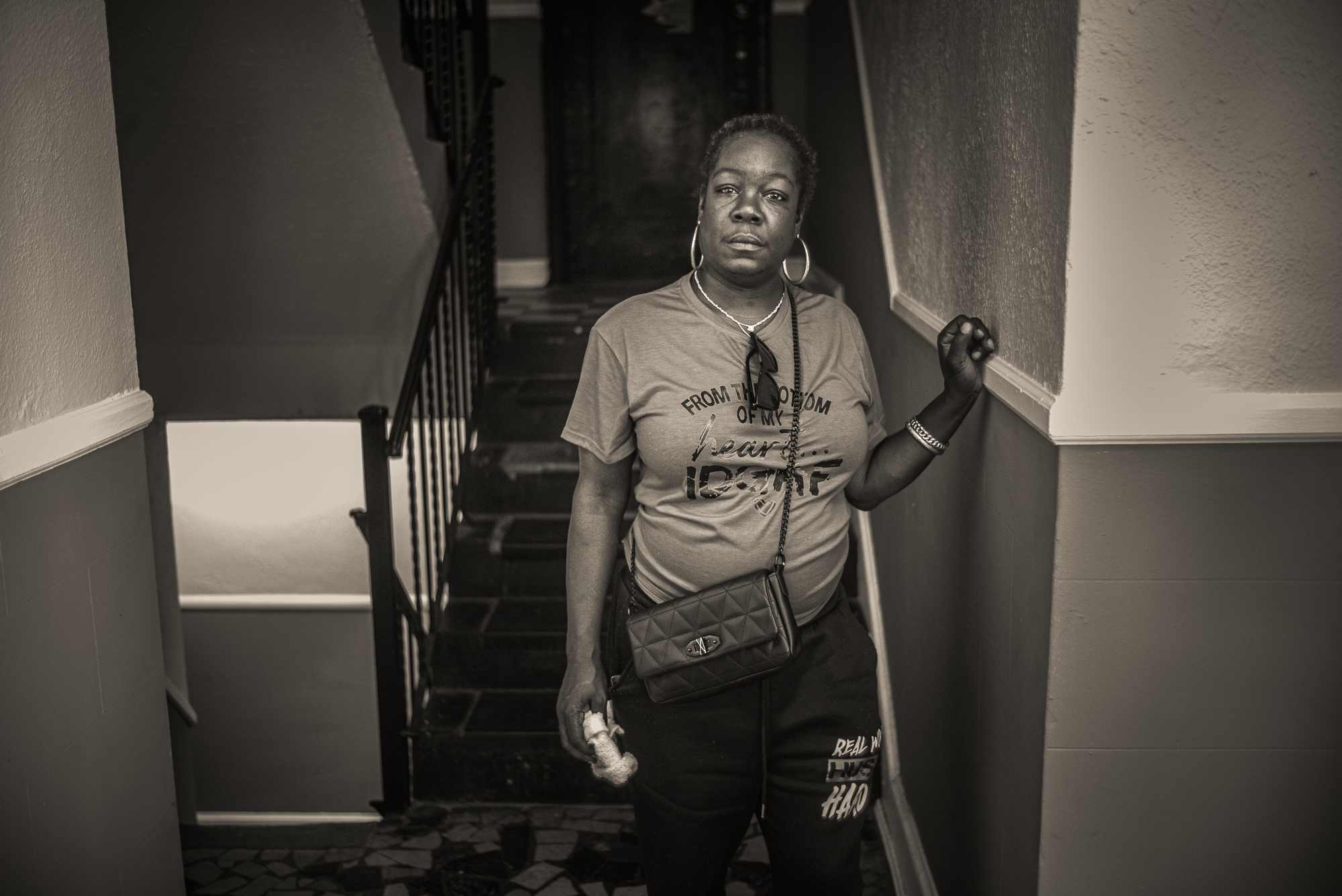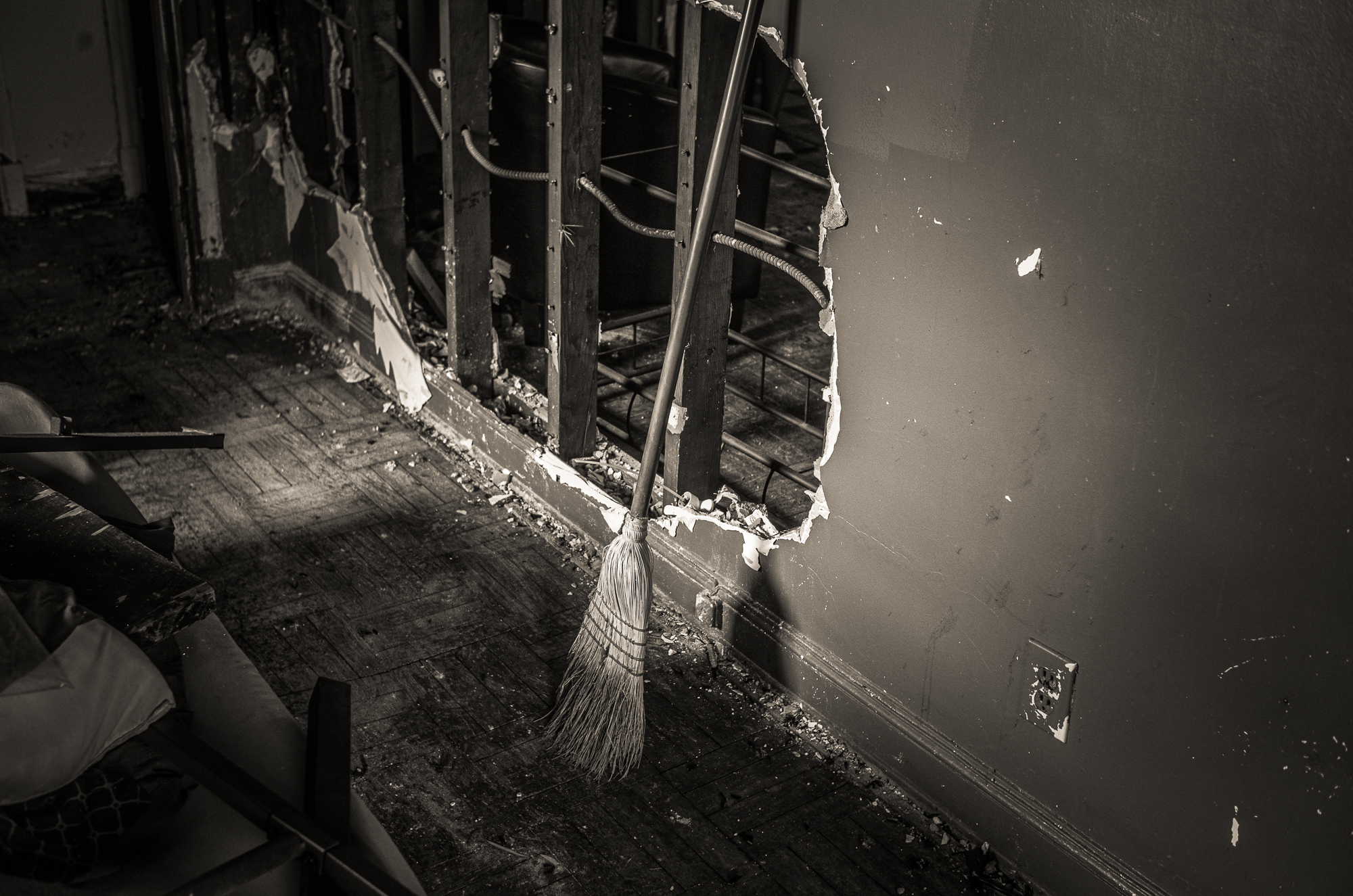This story was supported with funds from Spotlight DC—Capital City Fund for Investigative Journalism.
Photos by Darrow Montgomery
Tia Morsell called Scope Property Management’s maintenance line in a panic. Sewage was coating the floors of her basement apartment at 1717 S St. SE.
“The water was as high as my knees and taller than my baby,” Morsell says.
Although she was accustomed to delays in repairs from Scope Property Management, which was responsible for the building’s upkeep, she was hopeful that the gravity of the situation would prompt quick action. She got no response from Scope’s emergency line, so Morsell called the city’s 311 hotline for help. An inspector with D.C. Department of Consumer and Regulatory Affairs (a predecessor to the Department of Buildings) declared the unit “unfit for human occupancy.” The city immediately moved Morsell and her three young kids into a hotel.
An emailed notice of infraction sent to Steven Snider, the beneficial owner of 17TH AND S, SE LLC, the single entity LLC that owns the building, assessed fines totaling $17,712, including for the failure to provide smoke detectors or maintain fire extinguishers, and required repairs within seven days.
Almost a week after Morsell and her kids were forced to leave their home, the owner of Scope Property Management, Daniel Crosby, called her. She told him that the city would only foot the hotel bill for 10 days. After that, she had nowhere else to go. “He simply told me that it wasn’t his problem to handle,” she says. “He said if I didn’t have renters insurance, I was out of luck,” Morsell recalls.
Morsell says she and her three children—who were 1, 4, and 6 years old at the time—ended up in a homeless shelter for three months.
“I tried as much as I could to make sure my kids didn’t notice anything different,” she says about life at the shelter. Her 6-year-old, who had lived at the S Street apartment since infancy, repeatedly asked: “Why aren’t we at home?”
“We lost everything,” Morsell says.
Snider, the co-founder of Snider & Weinstein PLLC and a former partner at WilmerHale, has not responded to emailed questions about Scope’s management of the property.
Morsell’s experience living in a building managed by Scope is far from unique. A 10-month investigation into conditions at Scope-managed buildings, including reviews of tenant lawsuits, fire incident reports, housing code citations, and interviews with more than 60 current and former tenants, reveals a pattern of unsafe housing conditions, ignored requests for repairs, and displaced and traumatized tenants. Specifically, City Paper’s investigation found:
- Of the 30 Scope-managed properties reviewed for this article, eight buildings have had fires break out since 2020, according to D.C. Fire and Emergency and Medical Services incident reports. Some tenants became homeless or were displaced as a result.
- Despite numerous citations from the DOB for lack of fire safety devices, such as smoke alarms and fire extinguishers, tenants’ accounts reveal Scope’s continued failure to provide or maintain these basic lifesaving devices.
- Leaks and water damage are common issues at Scope-managed buildings, according to tenants and DOB notices of infractions. Some tenants have been forced to live with sewage pouring from their ceilings or overflowing from their toilets and bathtubs.
- Some tenants have reported going without working heat for months and years, resorting to using their stoves to stay warm in the winter.
- Tenants described a lack of basic services, such as consistent trash pickup, yard care, and pest control.
The D.C. government has paid about $1.5 million in rental housing subsidies for low-income tenants in buildings managed by Scope from July 2022 to April of this year, according to heavily redacted documents provided by the D.C. Department of Human Services in response to City Paper’s Freedom of Information Act Request. The D.C. Housing Authority denied City Paper’s request for voucher contracts with properties managed by Scope, citing privacy concerns, despite providing such documents in the past.
DOB (and its predecessor agency, DCRA) has issued more than 400 housing code violations, and assessed fines totaling more than $400,000 across 25 buildings managed by or partially owned by Scope.
“I was fortunate enough to get help from people who cared,” Morsell says, referring to the city’s emergency housing programs. “We had to start over. You can’t expect people to rebuild their lives while Dan sits comfortably in his nice home.”
***
The conditions in Scope-managed properties sound eerily familiar to Monica Jackson. She used to live at the Terrace Manor apartment complex and was the tenants’ association president in 2016 when the D.C. Office of the Attorney General targeted the building’s owner, infamous slumlord Sanford Capital, for the hellish and inhumane living conditions there.
Jackson remembers Crosby for his work with Sanford Capital’s property management company, Oakmont Management.
“Crosby was the face of Oakmont Management,” Jackson says. She recalls attending meetings with Crosby and Terrace Manor tenants regarding the horrific conditions in the building. Despite Crosby’s assurances, she says, months would go by as conditions deteriorated. Crosby “made a lot of broken promises,” Jackson says.
Sanford Capital, and its co-founder, Aubrey Carter Nowell, were required to fully divest from all residential properties they owned in D.C. and were barred from doing business in the District’s subsidized housing market for seven years after a 2018 settlement with the OAG. Sanford agreed to pay nearly $2 million across multiple settlements with the OAG and the Legal Aid Society, including about $1.3 million in restitution to tenants.
Crosby’s involvement with neglected properties goes back even further than his time with Sanford Capital. According to a 2005 federal charging document, Crosby participated in a conspiracy to purchase distressed properties and inflate the values with fake appraisals, causing “lenders to issue loans to the straw buyers in amounts that were more than the properties were actually worth, thus creating a large amount of illegal proceeds when the properties were ‘flipped’ to the buyers.” Lenders ultimately lost more than $5 million after most of the properties went into foreclosure.
Crosby pleaded guilty to one count of conspiracy to commit bank fraud, and after cooperating with the government, he received a 30-day sentence and was required, along with his co-conspirators, to pay $128,574 in restitution.
These days, Crosby lives in a beautifully maintained, $1.4 million Craftsman mansion in Anne Arundel County. He markets his property management company as having unique expertise in “luxury affordable housing” and claims in its ads that prospective tenants will “enjoy the peace of mind that comes with 24-hour emergency maintenance.”
But tenants in Scope-managed buildings, many of whom use housing vouchers to pay rent and are overwhelmingly Black, are left to live in squalid and dangerous conditions. Some are eventually displaced when their neglected apartments become uninhabitable.
“My experience was hell,” says Erica Barnes, a former tenant who is suing Scope, along with her former landlord, Ejar Properties, and its beneficial owner, Khalid Atizzi. “We are human, and no one should have to live like that.”

In the complaint filed in Superior Court in March, Barnes alleges that during the three years she lived at the Scope-managed duplex at 1216 Half St. SE, she contended with constant sewage leaks, rodent infestations, and mold. The leaks, she says, smelled like a combination of vomit and feces.
“My kids were ashamed to invite their friends over,” Barnes says. “I had to cook food at my mom’s because there were mice dancing on my stove.”
Barnes, who pays her rent with a housing voucher, says the DCHA stopped paying its share of the rental subsidy after multiple failed inspections. In May of 2022, Barnes was given a voucher to move to a new place.
The legal complaint, which includes claims for constructive eviction and unfair and deceptive trade practices, alleges that Scope “would sporadically send repairmen, but never adequately repaired the issues though they claimed that they did.”
In response to questions about the conditions at properties managed by Scope, Crosby writes via email: “At SCOPE Management our goal is to provide housing that everyone can enjoy, and I take pride in knowing that the SCOPE team makes the necessary steps to maintain and provide decent and safe housing for all tenants, applicants and perspective [sic] applicants.”

Aristotle Theresa, Barnes’ attorney, says that Scope’s claim that the company provides 24/7 repairs is misleading to its tenants and falls squarely within D.C.’s consumer protection law. Theresa worries about the future of housing in D.C., especially for tenants like Barnes.
“I see more inequality, more development in some parts of the city, and the concentration of affordable housing in certain parts of the city,” he says, adding that these “patterns are going to really entrench inequality.”
“I see a really segregated and unequal place,” he says.
***
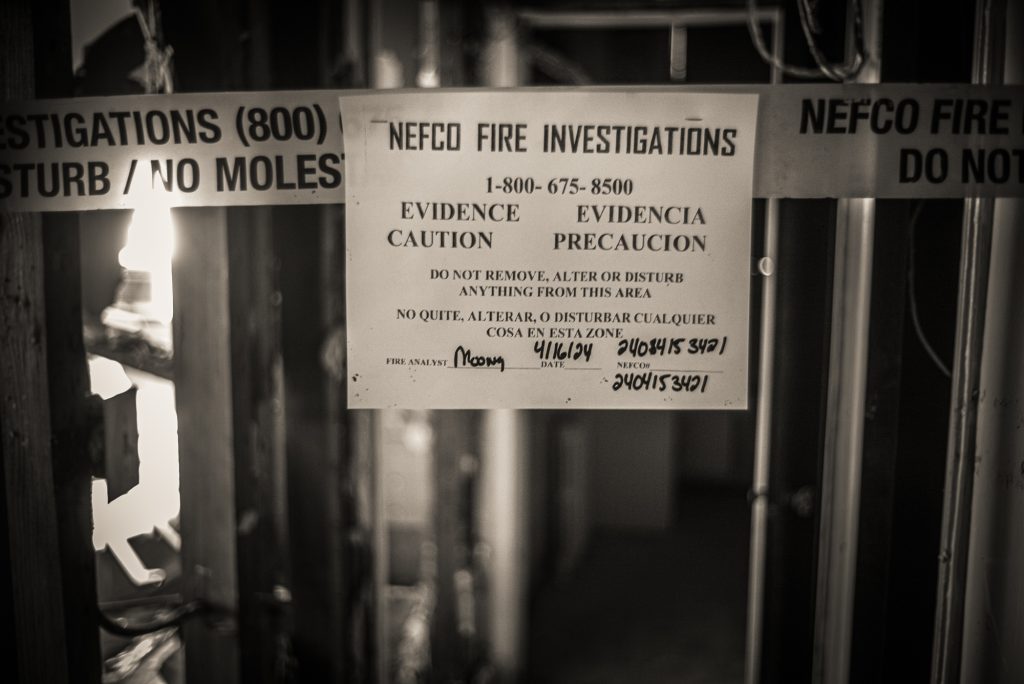
In the same month that Morsell was displaced by the sewage leak, a blaze burned through Tamika Hinton’s apartment building at 1516 18th St. SE. The D.C. government determined that almost every unit in the Scope-managed building was uninhabitable. A report on the blaze refers to the fire-damaged units as “unsafe structures” that were “likely to partially or completely collapse, or to become detached or dislodged.” Only Hinton was allowed to stay—for a time.
The fire, which originated in the upstairs hallway, caused soot and smoke damage in both upstairs units, according to the FEMS incident report, which does not mention Hinton’s downstairs unit.
The report hints at the possibility of arson, but investigators ultimately could not determine if the blaze was set intentionally. In one of the upstairs units, fire investigators found “signs of discarded smoking materials littered throughout the apartment,” and the report notes that neighbors said the occupant abandoned the unit several months prior, and that squatters had moved in. “The apartment was unsecured at the time of the fire,” the report says.
The building had been cited for multiple housing code violations at the time of the fire in May 2022. The violations in Hinton’s unit at that time included the failure to provide smoke detectors, carbon monoxide detectors, and outdoor trash removal. “I was left in there with big ass rats running around,” Hinton says of the seven months she remained in the boarded-up building.
After the fire, Scope initially told Hinton that she was allowed to remain in the building. But in the fall of 2022, Hinton says the company told her the fire department said she had to move. FEMS spokesperson Vito Maggiolo tells City Paper the department did not play a role in advising the building’s management to tell tenants to vacate.
And in an email response to City Paper’s questions, a DOB spokesperson confirms that only three units were initially condemned. But when DOB came back for a reinspection, on May 26, 2022, “there was no evidence that any repairs were made,” the spokesperson says.
“They were in a rush to get me out,” says Hinton, who pays her rent with the help of a housing voucher. The building was sold nine months after Hinton moved out.
In her new building, which was also managed by Scope, Hinton says the problems continued. She says she went for months without heat.
“I had to keep calling to get it fixed,” she says via text message. The back porch was “falling apart,” and she says she had issues with her hot water after repeatedly calling Scope to have the temperature adjusted.
Dahimer, a former Scope maintenance employee, who asked to be identified only by his middle name, says these tenants’ experiences are in line with what he saw on a daily basis while working for the property management company.
“Scope does not have the best interests of the people in their properties in mind,” Dahimer says, adding that, in his view, Scope did not employ enough maintenance workers to handle the volume of service requests.
In an email response to questions about Scope’s mistreatment of voucher holders, Crosby says that “Scope’s policy is to treat everyone fair. All repairs are completed on a first come, first served basis and are also subject to part availability and/or the need to be sub-contracted out.”
The lack of fire safety equipment, like smoke detectors and fire extinguishers, is especially troubling in light of the multiple fires at Scope properties. Since 2021, Scope properties have been cited more than 50 times for fire safety lapses, such as failing to provide working smoke alarms, fire extinguishers, carbon monoxide alarms, or illuminated exit signs, according to notices of infraction.
In addition to the fire in Hinton’s building on 18th Street SE, blazes broke out at three other buildings managed by Scope between 2020 and 2022. And in one of those buildings, 4401 Gault Pl. NE, two fires broke out in the span of four months in 2021.
The first, in September of that year, caused $25,000 worth of damage in one of the units, according to a fire incident report. DOB deemed two of the units “unfit for human occupancy.” The second fire, in December, was caused by a malfunctioning furnace in one of the units, according to the fire department’s incident report, which says a tenant used a fire extinguisher to put out the fire.
A lawsuit filed by one of the building’s tenants, Allegra Smith, alleges that Scope wrongfully evicted her after the fire. Smith says in the suit that she tried to return to her unit, “but the property manager Ms. Duckett informed me that I could not stay in my apartment.” Smith goes on to say in the complaint that “I learned that my landlord changed the locks to my apartment. I did not abandon the premises or turn over the keys.”
By June of 2022, the building was under contract for sale. City Paper could not locate Smith or the other tenants in the Gault Place apartments, but the building was sold in 2023, and the current owner tells City Paper that he lives in Smith’s old unit.
Another Scope-managed building on Meigs Place NE caught fire in July 2020. Jacinta Hagler says her electric furnace suddenly burst into flames, and she had to rush her two children out of the apartment.
“I’ve been through hell and high water with these people,” Hagler says of her experience dealing with Scope in the aftermath.
As she waited for the fire department, Hagler, who didn’t have a fire extinguisher, was able to put the fire out with a wet towel. She says the sprinkler system in her unit never activated.
When the firefighters arrived and asked to speak to the building’s owner, “[Scope employee] Duckett was giving me the runaround when I called her,” Hagler says. A frustrated fire sergeant eventually grabbed the phone and told Duckett he would condemn the building if the owner was not contacted and Hagler was not immediately relocated, Hagler recalls. She credits the fire sergeant’s intervention for the relatively speedy repairs to her unit. The fire incident report categorized the fire as “electrical wiring/equipment problem, other.”
“I don’t know what would have happened if I wasn’t home at the time,” Hagler says.
But even after Scope repaired the fire damage, Hagler says she went without heat that winter and used the oven to keep warm. “And I still have to deal with a roach-infested refrigerator and mice running around on my stove,” she says.
Edsel and Betty Kim, the beneficial owners of Blackstone M St LLC, which owns Hagler’s building, did not respond to City Paper’s calls or questions sent via text.
Hagler posed her own question for the couple, whose beneficial ownership filing lists their address as a $1.6 million home in Portland, Oregon: “I want people to understand that just because you have property and money, if you won’t live in it, why do you expect me to live in it?”
***
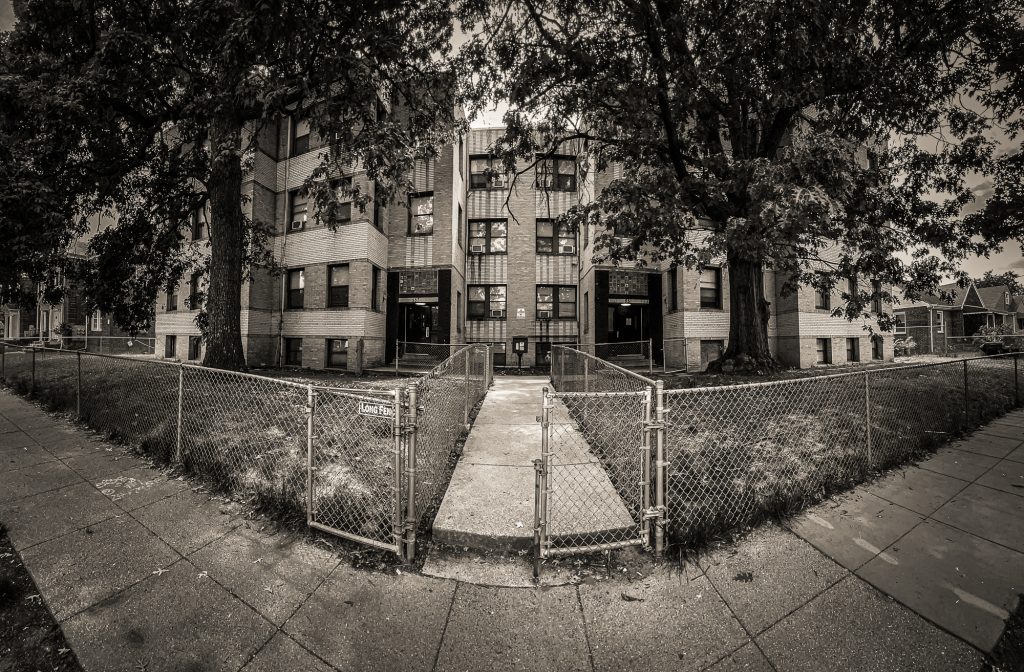
thirteen Scope-managed buildings with serious housing code violations were owned by LLCs whose beneficial ownership can be traced to one man: James Strasbourger. (Seven of those buildings have been sold in the past year and a half, and at least two others are listed for sale by Crosby, who is also a real estate agent.)
LLCs are commonly used by property owners to shield their personal assets from corporate liability and, in some cases, their identities from the public. Makenna Osborn, policy attorney with the Children’s Law Center, testified before the D.C. Council earlier this year about the difficulty in identifying negligent landlords who own multiple properties via single-entity LLCs. The D.C. Department of Licensing and Consumer Protection does not verify the accuracy of owners’ information, she says, and it can take time-consuming and sophisticated research to discover who is behind an LLC that owns a building.
“For families experiencing emergency situations like lack of electricity, heat, and hot water, every day that procedural hurdles delay their relief is unacceptable,” Osborn said.
Since 2018, buildings owned by Strasbourger through various LLCs have racked up almost $300,000 in DOB fines.
“I couldn’t even tell you the tenants’ names,” Strasbourger said when contacted by City Paper last year.
“It’s all controlled by property management. They do everything,” he added before hanging up. Strasbourger did not respond to emailed questions about the housing conditions in his buildings managed by Scope.
Through four different LLCs, Strasbourger owned four Scope-managed properties at the time they caught fire. Three of the buildings were sold after the fires; one is currently under contract; all of them were listed by Crosby in his role as a real estate agent with Equilibrium Realty.
The building at 646 Chesapeake St. SE, which was sold by Strasbourger’s LLC to Yoke Chesapeake LLC in December of 2022, was cited by the DOB months before the sale with 30 Priority 1 and 2 violations, which could threaten tenants’ health and safety and require repairs within one to seven days.
The man behind Yoke Chesapeake LLC, Christopher Grant, also founded Yoke Management Partners and has partnered with Scope to purchase and manage at least three properties: 2100 Channing St. NE, 2474 Alabama Rd. SE, and 551-557 Lebaum St. SE, according to Grant.

Grant is a Stanford University graduate and an honoree on Forbes 30 Under 30 list. Crosby and Grant are also fraternity brothers in Kappa Alpha Psi, one of the oldest Black Greek letter fraternities.
Yoke’s website describes Scope as “an affordable housing specialist” with a “10-year track record and a portfolio of nearly 1,000 units valued over $70M.” And a glowing article on the website for the Reinvestment Fund, a federally certified community development institution, touts Grant and Crosby’s partnership as a success in the 13-unit Channing Street building.
Grant says in the article that the building, known as the Langdon, is validation “that you can focus a business on impact-oriented housing, and [still] have success, and you can also try to maintain affordable rents while making it look nice.”
But tenants at the Langdon complain about the same lack of maintenance that tenants in other Scope-managed properties have described.
Langdon LLC, which owns the Langdon apartments, does not name any individuals in their beneficial ownership filings, as required by law, according to DLCP’s online database. Only Yoke Management, LLC and Scope Management are listed as the beneficial owners.
In an emailed response to questions about the housing conditions in Yoke-Scope buildings, Grant says that “the properties had received housing code violations without our knowledge – and despite our continued investment into the properties through Scope’s repairs and maintenance team functionality.” Grant adds that Yoke sent Scope warnings and requests to improve performance and conducted random property visits, and is working to disentangle itself from Scope’s property management services. (Crosby still has ownership interest in all Yoke properties in the District, according to Grant.)
According to Grant, Yoke uses Scope’s management services for all of its buildings, including the 21-unit adjoining buildings at 551-557 Lebaum St. SE. But in an email, Crosby blames Yoke for the tenants’ living conditions. “Yoke Management is exclusively and solely responsible for maintenance decisions for Yoke properties,” Crosby writes in an email. He did not respond to follow-up questions about the conditions at the other properties his company manages.
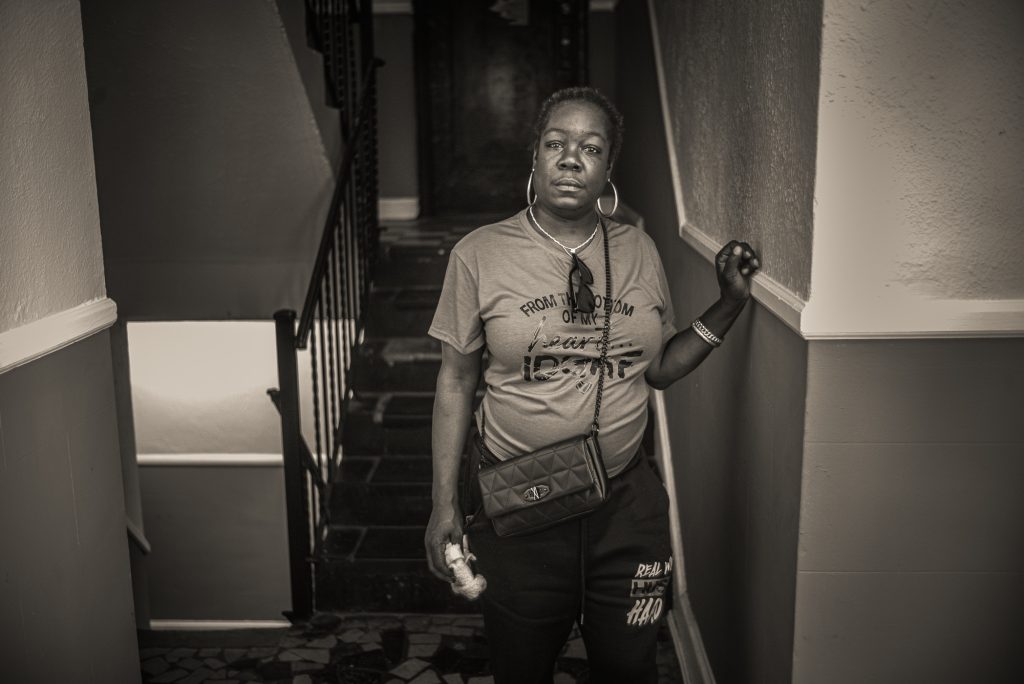
At a June tenants meeting, Ivory Frimpong, a representative for Yoke, heard directly from tenants at the Lebaum buildings about the lack of repairs since a fire broke out there in April. At least two tenants, Shana Wimbush and Omar Henderson, are now homeless as a result.
“The walls were just smoking,” Wimbush recalls in an interview with City Paper.
The fire, caused by the “failure of equipment or heat source,” resulted in approximately $120,000 in property damage, according to the fire incident report from FEMS. Wimbush suspects that Yoke’s repairs to her faulty bathroom outlet, made just two weeks prior, may have contributed to the fire.
Wimbush’s unit was deemed uninhabitable by DOB, but when she asked Grant if she could move into one of the empty units in the building, Wimbush says he refused. He told her that if she did not have renters insurance, there was nothing he could do for her, Wimbush says.
In an interview, Grant says he’s doing his best to return the displaced tenants to their units within a month. The remaining vacant units at the Lebaum buildings, which still need extensive repairs, are currently uninhabitable, he says.
Although landlords are not legally required to provide temporary housing for displaced tenants, when the displacement is due to the landlord’s failure to make repairs, “it certainly seems fair that the landlord provide (or pay for) actual housing,” says Marc Borbely, founder and senior attorney at the D.C. Tenants’ Rights Center.
He adds that “if the landlord isn’t making repairs that they’re required to make, and the property is uninhabitable as a result,” then a judge could order the landlord later to compensate the tenant.
Henderson’s unit also was deemed uninhabitable after the fire department’s efforts to extinguish the fire caused flooding in Henderson’s basement apartment. Henderson has been living in his car since his hotel subsidy ran out after two weeks, he says.

Nearly a month after the fire, and with no communication from Grant about repairs to her unit, Wimbush filed multiple complaints against Grant in D.C. Superior Court. She alleges in one filing that Grant “was aware of the fire and did nothing.” In a second complaint, she declares that “my landlord is not trying to help me at all. I lost everything I own. Plz help me. I have nothing and I’m homeless. The fire was their negligence.”
At the June tenants meeting, Wimbush got emotional when she asked Frimpong, the Yoke representative, about the status of her unit.
“I should not be homeless,” she told him. “My unit is vacant and nothing has been done.”
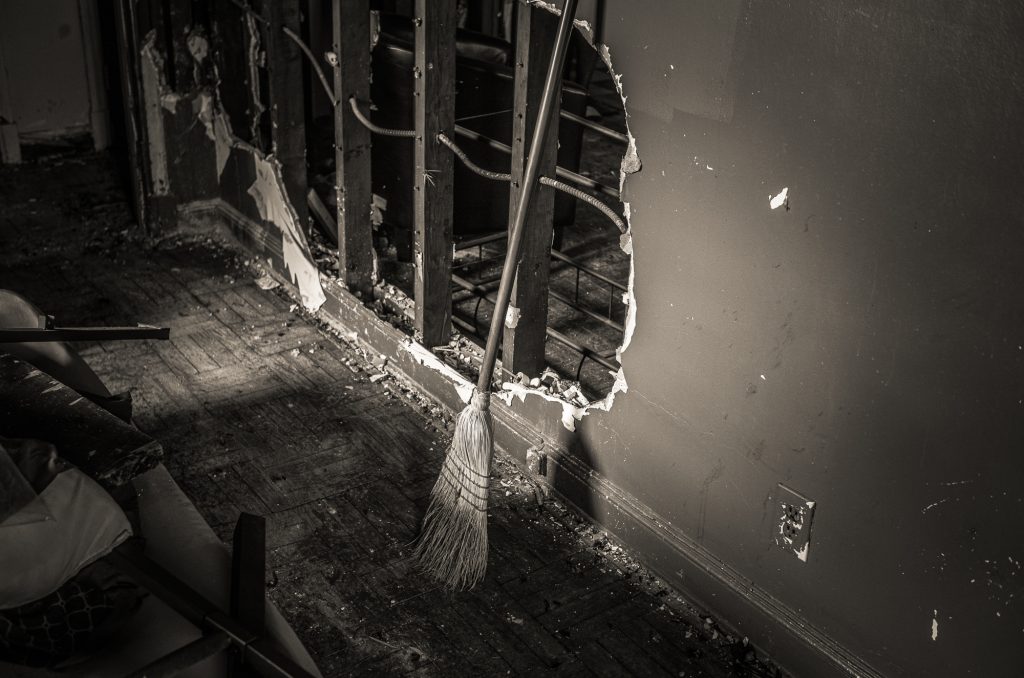
Grant says that he started Yoke in 2021 with a vision to transform neglected properties. He chose to partner with Scope in order to “execute our vision in a way that is going to make a meaningful difference in people’s lives. And one of the decisions we made, right or wrong, is a critical partnership.”
Grant explains that it was never his intent to displace tenants and that he was forced to take over maintenance of the building despite initially contracting with Scope to provide those services.
***
Edie Miller, who along with her brother, inherited the 11-unit building at 2nd Street and Mississippi Avenue SE, hired Scope to manage the building in early 2023. “I feel like I’m managing the building and Scope is sucking me dry,” Miller says in a phone interview. “I’m very disappointed in Scope, and I’m just as upset as the tenants because Scope does not respond to me either.”
One of those tenants, Thomas Armstrong, describes how, when sewage began overflowing into his bathtub, he had to bail out the fetid brown liquid on a daily basis to keep it from overflowing.
Armstrong has lived in the building for five years and says he noticed an instant decline in conditions when Scope took over management of the property. He says he promptly reported the health hazard to Scope, but it took the company almost a month to repair it. The stench was so strong, he recalls, that it wafted into the hallway outside of his unit.
Miller says she has hired another maintenance person to make repairs while she tries to get out of her contract with Scope. “We were naive” in hiring Scope, Miller says.
Eric Sirota, director of housing justice at the Chicago-based Shriver Center on Poverty Law, is not surprised by these tenants’ stories. He believes consumer protection agencies should target landlords and property managers who violate tenants’ rights. But, he continues, “the current system does not do enough to protect tenants, the most vulnerable of whom are disproportionately likely to be Black women with children or other marginalized groups.”
A spokesperson with the OAG advises tenants who believe they may have been subjected to deceptive housing practices to contact its Office of Consumer Protection at socialjustice@dc.gov or through their online complaint form.
Some tenants, like Barnes, left Scope-managed properties and found new homes. Her new property manager responds right away, she says, adding that “I can finally cook for my kids, something I couldn’t do in that rat-infested kitchen.”
But for others, as the District swelters under extreme heat, the future remains uncertain. Henderson, whose apartment in the building on Lebaum Street was damaged with water after a fire, has been living in his car. Wimbush, who has been displaced from the same building, has been living in a shelter when she can arrive in time to get a bed. A neighbor in the building has at times seen her sleeping under the stairs.
***



